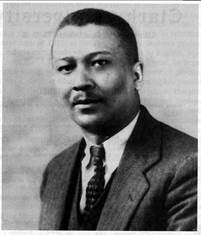Black History Month Celebration Continues
The Hope For Youth Cultural Diversity Committee had many individuals to select from, to share with you of their success and accomplishments. The following bio is of the individual considered to be the “Father of Black Psychology”. Francis Cecil Sumner, Ph.D. was the first African American to receive a Ph.D. in psychology, in 1920. We invite you to read and learn about him, and his many triumphs.
Francis Cecil Sumner was born in Pine Bluff, Arkansas on December 7, 1895. He was the second son of David Alexander and Ellen Lillian Sumner. Sumner attended elementary schools in Norfolk, Virginia, and Plainfield, New Jersey. His parents were concerned about the poor quality of educational opportunities for African Americans, so they worked to provide Francis with books and other materials, and they encouraged him to educate himself as they had done. Sumner never received a formal post-primary education. Sumner’s applications to schools would read “private instruction in secondary subjects by father”.
With no high school diploma, Sumner was required to take an examination to see if he was suitable to be admitted to Lincoln College (now Lincoln University), in Chester County, Pennsylvania, the first institution dedicated to and primarily for African Americans in the United States. Sumner passed the test and in 1911, at the age of 15, was admitted. Sumner graduated as valedictorian from Lincoln College, magnum cum laude in philosophy with special honors in English, Modern Languages and Greek, studying also Latin and philosophy, in 1915.
Sumner then went to Clark University in 1916 and in the fall, he received his second Bachelor’s degree in English. There, he developed a mentor-mentee relationship with the president of Clark, G. Stanley Hall and the dean of Clark University. Sumner graduated from Clark University in 1916 with his English degree. Sumner returned to Lincoln College as a graduate student and as a teacher of religious study, psychology, philosophy, and German. It was at this time that Sumner began to consider advancing his study in psychology. Sumner kept in contact with Hall, asking for assistance and consideration for a fellowship award to study “race psychology” at Clark University. This later became his area of focus as he worked toward “the understanding and elimination of racial bias in the administration of justice.”
In 1917, Sumner returned to Clark University, where he was awarded a senior scholarship and Hall approved his application for a Ph.D. in psychology. His education was postponed though in 1918 when he was drafted by the United States Military. He was sent to Camp Meade Maryland for basic training and thereafter, Germany. In his time there, he kept in contact with his mentor, G. Stanley Hall. Sumner asked to be reconsidered as a candidate upon his return. Sumner remained in France until he was discharged in the middle of 1919. After his doctoral dissertation entitled “Psychoanalysis of Freud and Adler” was accepted, he received his Doctorate degree from Clark University on June 14, 1920, making him the first African-American to receive a Ph.D. in psychology.
Sumner accepted a professor position at Wilberforce University in 1920. While at Wilberforce, Sumner was a professor of psychology and philosophy and in early 1921 he left to teach at Southern University in Louisiana. In fall of 1921, he accepted a position at West Virginia Collegiate Institute, where he wrote many articles dealing with the state of colleges and acceptance of African-Americans or the lack thereof. Sumner used these articles to support and raise awareness for the views brought up by Booker T. Washington and W.E.B. Dubois. He remained here for the next 7 years. Sumner was of the belief, and encouraged, that psychology move away from philosophy. He routinely failed to receive funding for his research and believed that race prejudice was the cause for him and other African American scientists. Sumner resigned in August 1928.
Sumner accepted a position at Howard University in fall 1928 and became the acting chair and professor until 1930 when he became the fully appointed chair of psychology. In his time at Howard, he succeeded in making the psychology department independent of philosophy. Sumner held the chair until his death in 1954.
Sumner had at least 45 publications throughout his career and was one of the first academics to contribute to the fields of psychology, religion and administration of justice. Sumner was a member of many associations including the American Psychological Association, the Eastern Psychological Association and the American Association for the Advancement of Science. He was also a member of several fraternal organizations including Psi Chi and Pi Gamma Mu.



